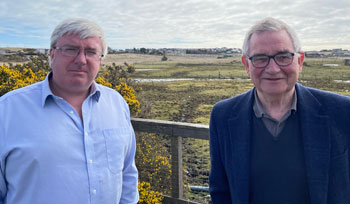
The year after next, David Montgomery will celebrate 50 years in newspapers – an anniversary that will come even earlier if you include his editorship of Gown, the Queen’s University Belfast student newspaper.
Yet Montgomery is not only still going strong but at the age of 72, the journalist, editor and newspaper executive is taking on perhaps the greatest challenge of his career – trying to revive the fortunes of JPI Media, publishers of The Scotsman and The Yorkshire Post.
When Montgomery and his backers took over a group with circulations “in free fall” at the beginning of this year, many in the industry were particularly shocked by one aspect of the deal – the selling price of the former Johnston Press.
The journalistic input has never been more important than it is today.
Bargain basement
A group that brings together around 200 titles, that had once been worth £2 billion in pre-internet days in the 1990s was bought by Montgomery’s National World for £10.2 million. Eyebrows were raised even further at the news that there was only a down payment of £5 million with the remainder paid in two further annual tranches.
Andrew Neil, former publisher of The Scotsman which was bought by Johnston Press for £160 million in 2005, described the decline as “one of the most egregious examples of value destruction in newspaper history”.
Montgomery insists the purchase price for the UK’s third largest regional group was “a realistic one”, and almost by definition, there was no-one willing, or able for competition reasons, to pay more.
“There was competition for it (the group) but we have been at it for two years and I had conversations with the hedge fund that owned JPI even before that,” Montgomery says.
“In terms of heritage and potential, there is real value there. Now we have to release that value. It won’t be a walk in the park,” admits Montgomery who put together Local World in 2012 and sold the business three years later to what is now Reach for £167 million.
Decentralise
Montgomery and his small team of Vijay Vaghela, former chief finance officer at Reach and Mark Hollinshead, former chief operating officer of what was then Trinity Mirror, have moved fast to decentralise, localise content (while production remains centralised) and, above all, restore power to editors on the ground.
The most dramatic example of the new approach is at one of the group’s smallest titles, The Stornoway Gazette in the Outer Hebrides. The paper was edited alongside other titles, from Hamilton on the Scottish mainland, by someone who had never previously been to Stornoway.

Now the paper that didn’t have its own editor has two, Murray MacLeod, who used to edit a Scottish Gaelic newspaper, and editor at large Brian Wilson, who founded the West Highlands Free Press. In the first week of the new regime, sales went up by 35 per cent.
A dozen small papers in north eastern Scotland were edited from Leeds providing what Montgomery calls dismissively, “generic Scottish content”.
“We are now making sure that each paper has an editor, or at the very least, a champion journalist supported by a commercial person,” says Montgomery.
“The Blackpool Gazette didn’t have a dedicated editor. It now has – Nicola Adam – and she’s absolutely brilliant and the paper’s coming alive,” adds the National World chairman.
In Crawley, home to Gatwick airport, it’s the same story. The Crawley Observer was edited from out of the area but in April, Mark Dunford, who has known Crawley all his life was appointed editor. Circulation is already up 28 per cent year-on-year.
“We have redeployed 150 journalists, in many cases to papers that didn’t have editors – they had regional content directors. You can glory in the position of editor, you can’t glory in the position of content manager,” says Montgomery who edited both the News of the World and the Today newspaper.
There have been cuts but they have been focused almost entirely on the top layer of editorial management most of whom have left the company. Montgomery says no front line journalists have lost their jobs, though some posts in training and development have gone.
“Journalists are either trained or they are not trained and we have a lot of very competent and long-serving journalists and the best way for them to bring on less skilled or younger journalists is by example,” Montgomery believes.
Overall savings have already hit £4 million on an annualised basis and that will rise to £5 million.
In his previous group, Local World, Montgomery obviously emphasised local information, much of it taken from the community with journalists acting, at least in part, as curators.
You can glory in the position of editor, you can’t glory in the position of content manager.
Emphasis on quality content
The Montgomery model has now evolved to take in not just the emphasis on localness and the restored power of independent editors but the importance of reliable, premium news rather than generic content or click bait.
“The journalistic input has never been more important than it is today,” says Montgomery who has renewed faith that news sells papers and drives audiences. In Northern Ireland and Scotland, it can even be political news.
The Newsletter in Belfast broke the story of the Democratic Unionist Party turning on its leader and Northern Ireland First Minister Arlene Foster, and sales that day rose by 12 per cent.
For Montgomery, the evidence of the first five months suggests that if the papers provide something that is unique rather than “fill it up with anything with a cover price that is just about justifiable” then readers will respond.
“Economically, there is an opportunity around providing reliable content. I think there is a great thirst for reliable content, the pandemic showed that. The trick for our industry is to serve people in a way they can be confident they are getting the right information and you don’t get that from the social media platforms,” insists Montgomery.
JPI journalists are also being encouraged to express their own views on local issues “as long as it is legal and decent and in the service of the community”.
Now that the top layer of senior editorial management has been removed, a self-support system has been put in place for editors.
“We have some very seasoned newspaper executives who are very happy to reach out to less experienced editors – people such as Mark Edwards at Northampton, David Summers in Peterborough and Barry Shipton in the Sussex stable,” Montgomery explains.
You have to have a starting point and that starting point is service to and engagement with the community and that’s all about content.
Role for print?
Will JPI remain a print-based publisher as digital expands? At least for now.
“We took the decision that we were going to give every title in the stable a chance to show what it could do based on relaunch and strong local content and that’s what we are working through now,” Montgomery explains.
In a fast-moving scene, there have already been more than a dozen relaunches, a number of frees have been turned into paid-for titles and a national website created.
The National World chairman still believes that “print carries the brand and the reputation” but accepts that eventually some titles may have to go digital only, “although as a company we are not at that stage yet”.
Acquisitions have not been ruled out but growth is more likely to be organic and the national website will be used for expansion into parts of the country where the company does not have a newspaper.
Montgomery is also chairman of Local TV, the second largest local television company with nine licences, run by former Sky executive Lesley Mackenzie.
The stations kept going throughout the pandemic and have a combined monthly reach of 3 million.
“I think the solution may be that you offer print, TV and online as a package at a local level. The government wants a levelling up of the economy and that should involve a levelling up of the media,” says Montgomery who denounces decisions by the BBC and Channel 4 to diversify geographically as “pure tokenism”.
Could it be that Montgomery, the canny Ulsterman, has with his purchase of JPI got a considerable bargain, despite the impact of the pandemic and the tough market for local and regional newspapers?
“You could argue that the recognition of the brand value, the potential and heritage of daily papers, particularly the Yorkshire Post, The Scotsman and the Newsletter, the Sheffield Star, the Portsmouth News, and the Lancashire Post as single titles are probably worth more than we paid for the whole company,” says Montgomery.
If the new owners of JPI can’t pull it off, probably no-one can. The early signs are encouraging.
The outlook
He is the first to accept that there is a long way to go to turn such theory into financial reality.
The brutal question is: Can David Montgomery, for all his experience across a long career with his latest distilled views on what the solutions might be for the regional press, actually make the business commercially viable?
“That’s the challenge, isn’t it? I am not starry eyed about this but you have to have a starting point and that starting point is service to and engagement with the community and that’s all about content,” insists Montgomery.
The newspaper industry will be watching closely to see whether the distinctive approach of Montgomery, Vaghela and Hollinshead, which goes against the conventional drive towards greater centralisation, can actually work.
If the new owners of JPI can’t pull it off, probably no-one can. The early signs are encouraging.
“The ideas will get adjusted as we go along but at this point, we are gratified that we seem to have got control of a situation that was pretty dismal and we are selling more papers than when we came into the business,” says Montgomery.
The National World chairman adds with more than a touch of understatement: “Probably people wouldn’t have imagined that would be the case.”
This article was first published in InPublishing magazine. If you would like to be added to the free mailing list, please register here.










